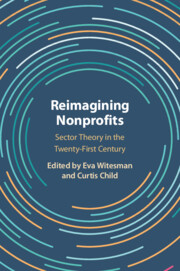Book contents
- Reimagining Nonprofits
- Reimagining Nonprofits
- Copyright page
- Contents
- Figures
- Tables
- Contributors
- Acknowledgments
- 1 An Invitation to Rethink the Nonprofit Sector
- Part I Overviews
- Part II Reflections and Refinements
- Part III New Directions
- 12 Nonprofits as Organizational Actors
- 13 Nonprofits as Enablers of Multilayered Representation
- 14 Nonprofits as Facilitators of National Self-development
- 15 Nonprofits as Part of an Engineered Social Economy
- 16 Nonprofits as Shaped by the Ruling Party
- 17 Nonprofits as Sources of Authoritarian Regime Stability
- 18 Nonprofits as Creators of Transformative Symbolic Reality
- 19 Nonprofits as Distributors of Toll Goods
- 20 Nonprofits as Agents of Moral Authority
- Part IV Conclusion
- Index
- References
14 - Nonprofits as Facilitators of National Self-development
from Part III - New Directions
Published online by Cambridge University Press: 11 January 2024
- Reimagining Nonprofits
- Reimagining Nonprofits
- Copyright page
- Contents
- Figures
- Tables
- Contributors
- Acknowledgments
- 1 An Invitation to Rethink the Nonprofit Sector
- Part I Overviews
- Part II Reflections and Refinements
- Part III New Directions
- 12 Nonprofits as Organizational Actors
- 13 Nonprofits as Enablers of Multilayered Representation
- 14 Nonprofits as Facilitators of National Self-development
- 15 Nonprofits as Part of an Engineered Social Economy
- 16 Nonprofits as Shaped by the Ruling Party
- 17 Nonprofits as Sources of Authoritarian Regime Stability
- 18 Nonprofits as Creators of Transformative Symbolic Reality
- 19 Nonprofits as Distributors of Toll Goods
- 20 Nonprofits as Agents of Moral Authority
- Part IV Conclusion
- Index
- References
Summary
This chapter introduces a self-development theory of the nonprofit sector, informed by alternative development and basic-needs theory. The theory presented in this chapter suggests that nonprofit law plays a role in creating a legal framework that allows people to participate in the improvement of their own lives and communities through self-development. With a nonprofit-friendly legal environment in place, individuals have greater economic incentive to work within their own communities to create organizations that help individuals, families, and communities to meet their own needs. This paradigm stands in contrast to views of nonprofit organizations as facilitators of rescuing behavior, in which one group of people seeks to uplift another. Based on cases in Nigeria and South Africa, this paper describes the role and importance of nonprofits in facilitating the development of individuals, institutions, and communities from within.
Keywords
- Type
- Chapter
- Information
- Reimagining NonprofitsSector Theory in the Twenty-First Century, pp. 273 - 290Publisher: Cambridge University PressPrint publication year: 2024

